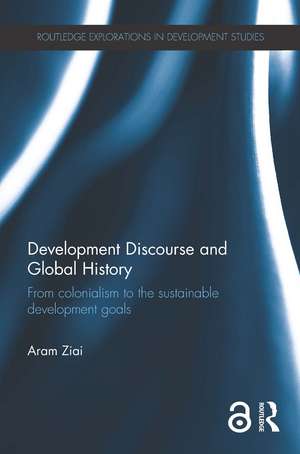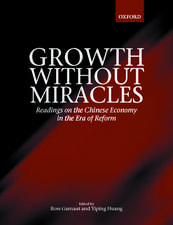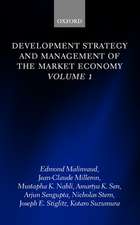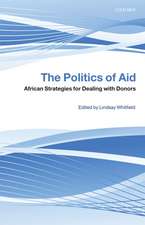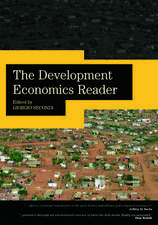Development Discourse and Global History: From colonialism to the sustainable development goals: Routledge Explorations in Development Studies
Autor Aram Ziaien Limba Engleză Hardback – 14 sep 2015
Development Discourse and Global History uses the archaeological and genealogical methods of Michel Foucault to trace the origins of development discourse back to late colonialism and notes the significant discontinuities that led to the establishment of a new discourse and its accompanying industry. This book goes on to describe the contestations, appropriations and transformations of the concept. It shows how some of the trends in development discourse since the crisis of the 1980s – the emphasis on participation and ownership, sustainable development and free markets – are incompatible with the original rules and thus lead to serious contradictions. The Eurocentric, authoritarian and depoliticizing elements in development discourse are uncovered, whilst still recognizing its progressive appropriations. The author concludes by analysing the old and new features of development discourse which can be found in the debate on Sustainable Development Goals and discussing the contribution of discourse analysis to development studies.
This book is aimed at researchers and students in development studies, global history and discourse analysis as well as an interdisciplinary audience from international relations, political science, sociology, geography, anthropology, language and literary studies.
The Open Access version of this book, available at http://www.taylorfrancis.com/books/9781315753782, has been made available under a Creative Commons Attribution-Non Commercial-No Derivatives 4.0 license.
| Toate formatele și edițiile | Preț | Express |
|---|---|---|
| Paperback (1) | 423.89 lei 6-8 săpt. | |
| Taylor & Francis – 7 feb 2017 | 423.89 lei 6-8 săpt. | |
| Hardback (1) | 1110.74 lei 6-8 săpt. | |
| Taylor & Francis – 14 sep 2015 | 1110.74 lei 6-8 săpt. |
Din seria Routledge Explorations in Development Studies
- 8%
 Preț: 389.80 lei
Preț: 389.80 lei -
 Preț: 310.45 lei
Preț: 310.45 lei -
 Preț: 325.72 lei
Preț: 325.72 lei -
 Preț: 325.72 lei
Preț: 325.72 lei -
 Preț: 152.57 lei
Preț: 152.57 lei -
 Preț: 155.44 lei
Preț: 155.44 lei -
 Preț: 311.41 lei
Preț: 311.41 lei - 8%
 Preț: 388.92 lei
Preț: 388.92 lei -
 Preț: 326.96 lei
Preț: 326.96 lei -
 Preț: 311.41 lei
Preț: 311.41 lei -
 Preț: 281.90 lei
Preț: 281.90 lei -
 Preț: 324.67 lei
Preț: 324.67 lei -
 Preț: 489.26 lei
Preț: 489.26 lei -
 Preț: 482.74 lei
Preț: 482.74 lei -
 Preț: 416.22 lei
Preț: 416.22 lei -
 Preț: 389.38 lei
Preț: 389.38 lei - 28%
 Preț: 821.06 lei
Preț: 821.06 lei -
 Preț: 389.38 lei
Preț: 389.38 lei - 18%
 Preț: 1000.27 lei
Preț: 1000.27 lei - 18%
 Preț: 998.71 lei
Preț: 998.71 lei - 26%
 Preț: 848.96 lei
Preț: 848.96 lei - 18%
 Preț: 1000.27 lei
Preț: 1000.27 lei - 18%
 Preț: 999.61 lei
Preț: 999.61 lei - 16%
 Preț: 299.87 lei
Preț: 299.87 lei -
 Preț: 299.52 lei
Preț: 299.52 lei -
 Preț: 411.42 lei
Preț: 411.42 lei - 14%
 Preț: 297.99 lei
Preț: 297.99 lei - 18%
 Preț: 1057.05 lei
Preț: 1057.05 lei - 18%
 Preț: 1060.25 lei
Preț: 1060.25 lei - 18%
 Preț: 1170.84 lei
Preț: 1170.84 lei - 18%
 Preț: 1000.27 lei
Preț: 1000.27 lei - 25%
 Preț: 544.50 lei
Preț: 544.50 lei - 31%
 Preț: 765.01 lei
Preț: 765.01 lei - 28%
 Preț: 851.46 lei
Preț: 851.46 lei - 18%
 Preț: 1000.27 lei
Preț: 1000.27 lei - 25%
 Preț: 767.38 lei
Preț: 767.38 lei - 31%
 Preț: 763.78 lei
Preț: 763.78 lei - 14%
 Preț: 301.33 lei
Preț: 301.33 lei -
 Preț: 485.07 lei
Preț: 485.07 lei
Preț: 1110.74 lei
Preț vechi: 1354.56 lei
-18% Nou
Puncte Express: 1666
Preț estimativ în valută:
212.56€ • 230.81$ • 178.55£
212.56€ • 230.81$ • 178.55£
Carte tipărită la comandă
Livrare economică 22 aprilie-06 mai
Preluare comenzi: 021 569.72.76
Specificații
ISBN-13: 9781138803251
ISBN-10: 1138803251
Pagini: 252
Ilustrații: 2 black & white illustrations, 1 black & white tables, 1 black & white line drawings
Dimensiuni: 156 x 234 x 20 mm
Greutate: 0.5 kg
Ediția:1
Editura: Taylor & Francis
Colecția Routledge
Seria Routledge Explorations in Development Studies
Locul publicării:Oxford, United Kingdom
ISBN-10: 1138803251
Pagini: 252
Ilustrații: 2 black & white illustrations, 1 black & white tables, 1 black & white line drawings
Dimensiuni: 156 x 234 x 20 mm
Greutate: 0.5 kg
Ediția:1
Editura: Taylor & Francis
Colecția Routledge
Seria Routledge Explorations in Development Studies
Locul publicării:Oxford, United Kingdom
Public țintă
PostgraduateCuprins
1. Introduction: The discourse of ‘development’ Part I - Theory 2. Poststructuralism, discourse and power Part II - Archaeology 3. From ‘civilising mission’ to ‘development’ 4. An archaeology of development knowledge 5. The concept of ‘development’ and why it should be abandoned 6. Development discourse: appropriation and tactical polyvalence Part III - Genealogy 7. The transformation of development discourse: Participation, sustainability, heterogeneity 8. From ‘development’ to ‘globalisation’ 9. World Bank discourse and poverty reduction 10. ‘Development’: projects, power and a poststructuralist perspective 11. Millennium Development Goals: back to the future? 12. Justice, not development. Sen and the hegemonic framework for ameliorating global
inequality 13. Migration management as development aid? The IOM and the International Migration
and Development Initiative 14. The Post-2015-Agenda and the Sustainable Development Goals: the persistence of
development discourse Part IV - Conclusion 15. Conclusion: The contribution of discourse analysis to development studies
inequality 13. Migration management as development aid? The IOM and the International Migration
and Development Initiative 14. The Post-2015-Agenda and the Sustainable Development Goals: the persistence of
development discourse Part IV - Conclusion 15. Conclusion: The contribution of discourse analysis to development studies
Recenzii
"Development Discourse and Global History vividly follows the avatars of the development discourse from colonialism to the present, from the ‘civilizing mission’ to the SDGs and the newest subfields such as migration and development. It admirably deploys Foucauldian theory and methodology, demonstrating why its author has become the most persistent and insightful analyst of development from poststructuralist perspectives. With this collection of essays not only does Ziai bring the critical analysis of development up to date, he enlightens us on previously understudied aspects of it, principally the change and transformation it has undergone since its inception. By showing us the inconsistencies and contradictions of the discourse, and not only its negative effects and progressive appropriations, he provides us with a new platform for arguing why the concept of development needs to be abandoned, perhaps in favor of simpler, more honest notions, less encumbered by colonialist histories and Eurocentric categories. In doing so, finally, he renews the promise of critical theory as a crucial element in the toolkit for constructing other possible worlds." – Arturo Escobar, Kenan Professor of Anthropology, University of North Carolina, Chapel Hill, USA.
"The book’s main strength is the way in which it draws together a wide range of critical discussions of development and condenses from them a coherent and clear critique of development. While discourse analysis (and other poststructuralist approaches) are often criticised for using obscure or unnecessarily complex language, Ziai’s book is clear and jargon-free. Furthermore, it begins with a very accessible discussion of poststructuralism and discourse analysis rather than assuming familiarity with the terms that will be used in the rest of the book." – The Journal of Development Studies, Sally Matthews, Rhodes University
"this book is a great contribution to critical development studies. The reader will find abundant, solid, coherent, empirically based arguments proving that the development discourse is an exemplary case of a knowledge-power discursive formation. Instead of assuming that 'development' offers a solid framework to apprehend injustice and human suffering, Ziai shows the profound onto-epistemological complexity of the problem - arguably the only way to rethink the issue in order to find different ways to effectively promote change." – Progress in Development Studies, Juan Telleria, University of Essex and HEGOA Institute University of the Basque Country (Spain)
"Development is a complex social, economic and political phenomenon. While various kinds of aid have been delivered from developed to developing countries in the name of development, there remain many development issues in the developing countries which are still dependent on the guidance of development theories, such as liberal economic theories, Marxist theory, and dependency theory, as well as various development programs and projects at both national and international levels. What is development and How can development phenomena be understood? In this book, Aram Ziai explores the concept and nature of development by skilfully combining his arguments with empirical materials, drawing on the Foucauldian archaeology and genealogy methodologies.[...] Ziai’s book outlines a productive interdisciplinary research project, bringing together discourse analysis and development studies, and will be a good and informative read for scholars and students in the fields of discourse analysis, development studies, global governance studies, international management, international politics, sociology and cultural studies." – Discourse & Communication 12(6), Reviewed by Yuan Chang, Zhejiang University, China
"The book’s main strength is the way in which it draws together a wide range of critical discussions of development and condenses from them a coherent and clear critique of development. While discourse analysis (and other poststructuralist approaches) are often criticised for using obscure or unnecessarily complex language, Ziai’s book is clear and jargon-free. Furthermore, it begins with a very accessible discussion of poststructuralism and discourse analysis rather than assuming familiarity with the terms that will be used in the rest of the book." – The Journal of Development Studies, Sally Matthews, Rhodes University
"this book is a great contribution to critical development studies. The reader will find abundant, solid, coherent, empirically based arguments proving that the development discourse is an exemplary case of a knowledge-power discursive formation. Instead of assuming that 'development' offers a solid framework to apprehend injustice and human suffering, Ziai shows the profound onto-epistemological complexity of the problem - arguably the only way to rethink the issue in order to find different ways to effectively promote change." – Progress in Development Studies, Juan Telleria, University of Essex and HEGOA Institute University of the Basque Country (Spain)
"Development is a complex social, economic and political phenomenon. While various kinds of aid have been delivered from developed to developing countries in the name of development, there remain many development issues in the developing countries which are still dependent on the guidance of development theories, such as liberal economic theories, Marxist theory, and dependency theory, as well as various development programs and projects at both national and international levels. What is development and How can development phenomena be understood? In this book, Aram Ziai explores the concept and nature of development by skilfully combining his arguments with empirical materials, drawing on the Foucauldian archaeology and genealogy methodologies.[...] Ziai’s book outlines a productive interdisciplinary research project, bringing together discourse analysis and development studies, and will be a good and informative read for scholars and students in the fields of discourse analysis, development studies, global governance studies, international management, international politics, sociology and cultural studies." – Discourse & Communication 12(6), Reviewed by Yuan Chang, Zhejiang University, China
Descriere
Development Discourse and Global History uses the archaeological and genealogical methods of Michel Foucault to trace the origins of development discourse back to late colonialism and notes the significant discontinuities that led to the establishment of a new discourse and its accompanying industry. This book goes on to describe the contestations, appropriations and transformations of the concept. It shows how some of the trends in development discourse since the crisis of the 1980s – the emphasis on participation and ownership, sustainable development and free markets – are incompatible with the original rules and thus lead to serious contradictions. The Eurocentric, authoritarian and depoliticizing elements in development discourse are uncovered, whilst still recognizing its progressive appropriations. The author concludes by analysing the old and new features of development discourse which can be found in the debate on Sustainable Development Goals and discussing the contribution of discourse analysis to development studies.
